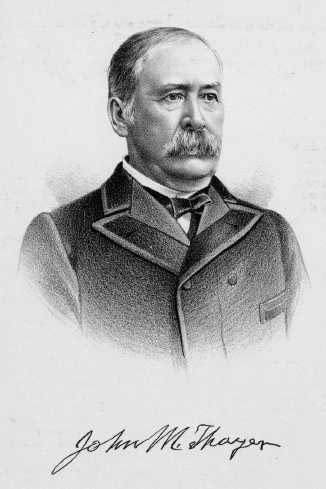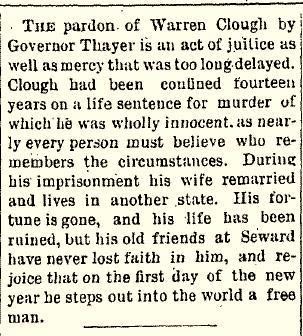New Year’s Day in 1891 was a momentous one for Warren Clough, who had spent almost fifteen years in the Nebraska State Penitentiary for the 1876 murder of his brother, Nathan, in Seward. Clough was granted a new chance for life outside prison walls by a pardon issued by Nebraska Governor John M. Thayer, which took effect on January 1.
The crime for which Clough was convicted and incarcerated was well remembered by residents of Seward and York counties. Warren Clough, who with his wife kept the Blue Valley House hotel at Seward, was accused of murdering his brother, Nathan Clough, a horse breeder, at the hotel. The motive was apparently robbery. Warren denied any involvement in the crime, but it was noted that some jealousy had existed between the two brothers and that only Warren had known that Nathan had with him a large sum of money at the time he was killed-money that was missing after the murder was discovered.
Despite the lack of definitive evidence against Warren Clough, he was widely blamed by his neighbors for the gruesome killing (done with an ax), and he was eventually indicted and tried for murder. Feeling against him was so strong in Seward that a change of venue was granted and the trial took place in the neighboring city of York. He was convicted of murder in the first degree and was sentenced to be hung. On the evening before the execution was to take place, Governor Silas Garber commuted the sentence to life imprisonment.
As the years progressed, however, doubts grew about Clough’s guilt. The Omaha Daily Bee in its January 1, 1891, report of Thayer’s New Year’s pardon, said, “The evidence that convicted Clough was circumstantial only, but somebody had to be punished for the crime and on the brother of the murdered man the blame was laid. The old neighbors of Warren Clough in Seward have of late begun to believe that possibly an innocent man might have been punished. The testimony brought out in the trial a decade and a half ago has been reviewed and not only have his old acquaintances, but the prosecuting attorney that worked for his conviction, the judge that sentenced him, and a number of the surviving jurymen that sealed his doom, have all united in asking Governor Thayer to free the old man.”
Judge O. P. Mason, who had defended Clough at trial, “made a most eloquent plea for the imprisoned man. He declared that there had not been a scintilla of evidence presented that would convict Clough, that the conviction was on only the slightest evidence; that the testimony which sent Clough to the penitentiary was, in fact, not sufficient to bind him over to the district court.” The Bee noted on January 2, 1891, that “[w]ithin the past few weeks important testimony has been developed showing that Jacob Trent and Charles Wilcox, both in the employ of Warren Clough at the time, were the real murderers.” Trent had reportedly once told Mason “that Clough was an innocent man and if the worst came he would tell all. Before he could tell all he suddenly died with heart disease in the penitentiary.”
After his release, Clough went back to Seward, where he was given a reception and dinner, but he found it difficult to return to his former life. The hotel he once operated was now owned by others, and his wife had secured a divorce and married again, relocating with their son to Oklahoma. Warren Clough reportedly went to Oklahoma to visit them, and died there several years later.

Governor John M. Thayer granted a pardon to accused murderer Warren Clough. From Portrait and Biographical Album of Otoe and Cass Counties Nebraska (Chicago, 1889).

From the Kearney Daily Hub, January 2, 1891



